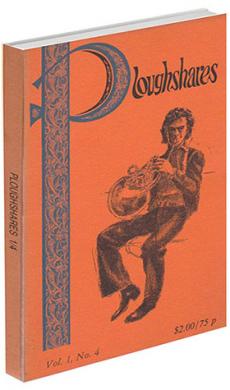rev. of The Lady in Kicking Horse Reservoir by Richard Hugo
Several nights after the day his book reached the counters of three of Missoula's bookstores (the fourth sells prose pornography), Richard Hugo was offering the following terse explanation of the significance of the title,
The Lady in Kicking Horse Reservoir, to a group of local admirers: "Sir Walter Scott wrote a poem called "The Lady of the Lake,' and Raymond Chandler wrote a novel called
The Lady in the Lake. I have considered the competition," he said with resignation, "and it looks like Sir Walter and I will have to fight it out for second place." Hugo's respect for Chandler is unfeigned, and if Philip Marlowe had had a poet's voice instead of a detective's, Hugo's words might have been his; the two move across the same hard American surfaces — a wind-blown reality filled with false-fronted bars, dried-up towns, and anonymous graves. Yet, beneath Hugo's tough-guy disillusionment and hardness there is a profound sentimentality, the Montana prospector's naive faith shared that there is gold in those hills and streams: "Before I go that long east to my gold/ I shout my best goodbye across the roar" to "the Gold Man on the Becker."
The cumulative effect of Hugo's poetry, however, is that naivete hasn't got a chance. The form does it in. Though I do not know its name, the form is largely that of rhetoric, language employed persuasively and strictly for its own sake. Hugo does not try to describe reality so much as to defy it, and the form gives the defiance its sharpness and control. Tremendous rhythmic constraint is imposed on wild emotions so that the form becomes a bright, hard surface, reflecting verbal defiance. In "Somersby" for example, the shortest poem in the volume:
Mercy Jesus Mercy
cries a stone
b 1586
d 1591
and Tennyson's brook
drones on
biographical sentiment is crystallized and excluded from Tennyson's redemptive brook by the epitaphial form. Similarly, life becomes little more than hard words in "Drums in Scotland," words held in check by the poet, "No warmth in eyes, arms, anything/but words. No warmth in words."
But what makes Hugo's poetry especially powerful is exactly this remorseless hardness. The poet avoids dramatizing what was already drama in itself in poems like "Somersby" and secures a tone of truth, of honesty. This is good rhetorical technique. But Hugo occasionally will take the technique one step further into the area of language where rhetoric becomes hymn and the poet becomes religious — not religious in any particular sense, but religious all the same. "St. Ignatius Where the Salish Wail" describes a religious ceremony held on Good Friday at the Mission on the Flathead Indian Reservation. The poem begins with Hugo's characteristic gruff tone, "It's a bad Good Friday, snow and mud/ and mongrels in the road"; and before the poem is three lines old Hugo has begun talking to a malevolent sky so that it seems as if once more hard words are going to pare the world down to Hugo's stark dimensions. But before that can happen a new set of words in the nearly
forgotten Salish dialect intrudes and "burns on their tongues." Like Hugo's words, these too imprison and restrict with their reverential rhetoric. "Their chanting/bangs the door of any man's first cave," but their words are no longer bound to the sense or even to particularized meanings. Rhetoric has been transformed into pure sound and feeling. The last stanza ends unfinished,
We were renegade when God had gills.
We never change. Still, the raw sound
of their faces and the wailing unpretentious
color of their shawls –
The power of Hugo's poetry in "St. Ignatius" is in the intentional merging of the poet's voice and rhetoric with another and older voice. Throughout the poems in this collection the Indians continue to symbolize that voice; but Hugo says that the voice is dying away, and, without saying so directly, wants, I thin, to reclaim it with his own. Hugo's enemy is the Indian's — time passing — and the hardness of his poetry is only the attempt of one man "to conquer loss/ by going to the place it happened/ and replaying it, saying the name/ of the face in the open casket right."
To name a thing is, in a way, to stop the relentless effacing of identity by time and time's symbol, the "wind," but, curiously, Hugo often refuses to name where we might expect him to. The title poem of this volume, "The Lady in Kicking Horse Reservoir," is an example of this willing suspension of identity by Hugo, in this case the identity of his ex-lover. She is only an anonymous "Lady." Her very anonymity begins as a kind of curse invoked upon her by Hugo, who has by the force of his rhetorical fantasizing located her bloating at the bottom of the Reservoir, "Summer slime/ will pile deep on your breast." But by midway in the poem the mood has changed from vindictiveness to apology and a sense of loss, "Sorry. Sorry. Sorry," and her anonymity has become the Indians', "But arrows sing:/ no way to float her up," and his, "Loners like work best on second shift." Then, in a single epiphanic stroke at the end, redemption, not from
anonymity, but from time occurs:
The spillway's open and you spill out
into weather, lover down the bright canal
and mother, irrigating crops
dead Indians forgot to plant.
Like a Salish shaman he invokes the seasons, placing himself, "the Lady," and Indians in the same timeless cycle of nature. The same impulse in "St. Ignatius" away from words as meaning to words as sounds — chants — operates here to preserve anonymity so that rebirth may occur. Ultimately naming for Hugo is a futile finger raised to time as the "Somersby" epitaph suggested. Places are given nominal uniqueness in Hugo's poetic landscape, but places, even more than people, register the passing of time.
Indeed, moribund or ghost towns like Ovando, Helena, Dixon, and Philipsburg appear with depressing frequency in this volume, and it is possible, even likely to read Hugo's poetic statement as a Western addition to the East Coast wasteland. But I think this would be a mistake, for as Hugo says in "Ghosts at Garnet," "beneath our skin, gold veins run wild to China." Beneath desperate appearances, cruel words, and place names is a primitive, natural urge to survive, to remain anonymous "Driving Montana":
. . .you are lost
in miles of land without people, without
one fear of being found, in the dash
of rabbits, soar of antelope, swirl
merge and clatter of streams.
Hugo's poetry is not regional in the limiting sense of the word.
Good Luck in Cracked Italian describes the poet's experiences in Italy, and the third and fourth sections of
The Lady in Kicking Horse Reservoir tour the British Isles and Spain; however, I think his best poems are set in Montana. Perhaps this is so because Montanans, for all of Hugo's distant pity of them, are really Hugo's people — awkward, frightened, and unsophisticated. Hugo identifies with them in ways he would never identify with Europeans and their ancient history and lands. But settings are no more than "maps" for these poems, skeletons to be animated by Hugo's rhetoric; and it is this rhetoric that is wonderful. Chandler's novel,
The Lady in the Lake, ends with the final despairing fragment and paragraph, "Something that had been a man." But beneath the toughness Hugo shares with Chandler is vital defiance, "Say no to yourself" he says in the last poem, "Degrees of Gray in Philipsburg"
Say no to yourself. The old man, twenty
when the jail was built, still laughs
although his lips collapse. Someday soon,
he says, I'll go to sleep and not wake up.
You tell him no. You're talking to yourself.
The sheer power of words to confront and irrationally deny in order to live, creates and sustains Hugo's rheotorical reality.

